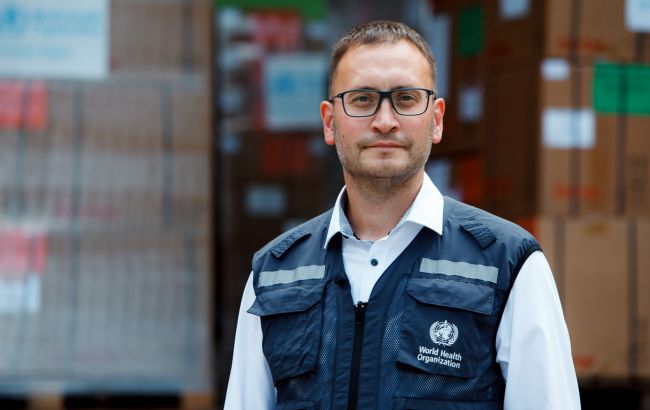Three reflections from two years: WHO’s response to Europe’s largest emergency
 Photo: Dr. Jarno Habicht, WHO Representative in Ukraine (RBC-Ukraine, Vitalii Nosach)
Photo: Dr. Jarno Habicht, WHO Representative in Ukraine (RBC-Ukraine, Vitalii Nosach)
WHO Representative in Ukraine, Dr. Jarno Habicht, on the World Health Organization's response to Ukraine's healthcare crisis during the war, the significance of locally-led initiatives, sustaining routine care amid turmoil, and bolstering Ukraine's healthcare workforce for enduring resilience.
Two years into Europe's most significant crisis in decades, Ukraine's challenges and its remarkable adaptation have a lot to teach.
The World Health Organization (WHO) has been an active partner to Ukraine, navigating the complexities of delivering health support in a war-torn country. Our journey has unfolded lessons of immense value, not just for Ukraine but for the global health community.
As we mark this grim anniversary, it is crucial to reflect on these insights and how they shape our collective path forward.
A locally led response
Often, humanitarians rush in to support a country in crisis by creating immediate relief systems that may create siloes, inadvertently weakening already vulnerable national systems.
Ukraine's continuous leadership and determination to lead its own response have underscored the importance of supporting existing systems rather than overlaying them with parallel structures. WHO has been partnering with Ukraine’s Ministry of Health to determine, in real-time, what the key needs of the sector are and step in where needed to bolster existing systems.
This includes regularly donating essential medical supplies, vehicles, and equipment to ensure existing healthcare facilities can continue functioning. In communities where health facilities have been damaged or destroyed, we’ve built temporary structures to help ensure continuity of care. Currently, 12 modular primary care clinics are open in vulnerable communities across the South and the East of the country. There, doctors and nurses — often the same personnel that worked in a previous facility — continue to provide care, giving people hope, some sense of normality, and trust. They are not forgotten or abandoned.
After the Nova Kakhovka dam's destruction in June 2023, WHO aided local authorities with water surveillance and increased medical staffing to combat water-borne diseases and address health service gaps. Over two years post-invasion, our focus has been on reinforcing Ukraine’s Emergency Medical Services and routine healthcare, ensuring adaptability and resilience.
Through our unique mandate as a convener for public health matters, we are also helping our partners localize better. The Health Cluster and the Technical Working Group on Mental Health, both led by WHO and consisting of dozens of international and local national partners, now coordinate health response activities at the Oblast level, making sure Ukraine’s vast size and population diversity are taken into account when designing any new intervention.
Routine care and long-term development should not slip away
Since February 2022, our teams have verified 1,574 attacks on health, claiming the lives of 118 of healthcare workers, and impacting health facilities, transport, and warehouses.
The attacks have disrupted access to critical health services for thousands, often for an already vulnerable population, which includes the elderly, children, and people with disabilities.
Addressing immediate needs like treating injuries and restoring services in damaged facilities is vital, but so is fortifying the healthcare system to endure ongoing assaults and prevent routine care disruptions, which could irreparably harm the population's health. With non-communicable diseases (NCDs) causing 84% of illnesses and deaths in Ukraine, the creation of the Mobile Outreach Units has been critical, providing frontline treatment for conditions from heart disease to diabetes. Additionally, we're boosting primary healthcare by enhancing capacity, revising costs, promoting best practices, and advocating for increased funding and better working conditions for healthcare workers.
The war’s impact on mental health is profound, with 9.6 million people estimated to be at risk of or living with a mental health condition. WHO, alongside Ukraine’s government and First Lady Olena Zelenska, is making mental health a top priority, addressing rehabilitation needs, backing community-led initiatives, and training health workers to recognize and respond to mental distress.
At the same time, we are supporting longer-term reforms to strengthen areas such as health security, modern public health surveillance, and water, sanitation, and hygiene (WASH) to help catalyze comprehensive improvements in public health infrastructure, safeguarding it against ongoing and future threats.
Despite the war, Ukraine has not only maintained but progressed in health initiatives, such as tobacco control and trans fats regulation, and has quelled the polio outbreak of 2021, showcasing its strong commitment to health and its advancement towards European Union accession.
Human capital is Ukraine’s present and future
At the heart of Ukraine are its people, and they are facing enormous challenges.
Before the war, Ukraine was aging rapidly, with the elderly expected to be 20% of the population by 2030. The refugee exodus likely accelerated this. Chronic diseases and healthcare disruptions from the war aggravate an already delicate health situation. In 2023, 11% delayed medical care due to the conflict. Internally displaced persons (IDPs), now 18% of the populace, and frontline communities, where up to 43% deferred care, are in a dire state. Financial struggles prevent nearly 40% from buying necessary medicines.
These people can only be helped by a resilient healthcare workforce. The dedication of Ukraine’s healthcare workers, often at great personal risk, is the backbone of the country's health response. WHO is supporting these individuals by improving working conditions and providing additional funding and mental health support.
The humanitarian and development funding provided to Ukraine over the last 24 months by generous donors has been critical in this regard. It is that support, coupled with evidence-based technical expertise, that allowed us to reach millions with critical life-saving interventions.
Humanitarian and development partners will continue to strengthen capacity and provide necessary resources, but ensuring financial support for the health system and workers is imperative to avert a health system collapse and sustain Ukrainians through this crisis.
The war in Ukraine is more than a geopolitical crisis; it's a stark reminder of the interconnectedness of health, peace, and security. As we enter the second decade of war that started in 2014 and a third year since the Russian Federation's full-scale invasion in 2022, continuous international support is crucial for the country’s recovery and for building a healthier, more resilient future for the region.
This material is for informational purposes only and should not be used for medical diagnosis or self-treatment. Our goal is to provide readers with accurate information about symptoms, causes, and methods of detecting diseases. RBС-Ukraine is not responsible for any diagnoses that readers may make based on materials from the resource. We do not recommend self-treatment and advise consulting a doctor in case of any health concerns.

